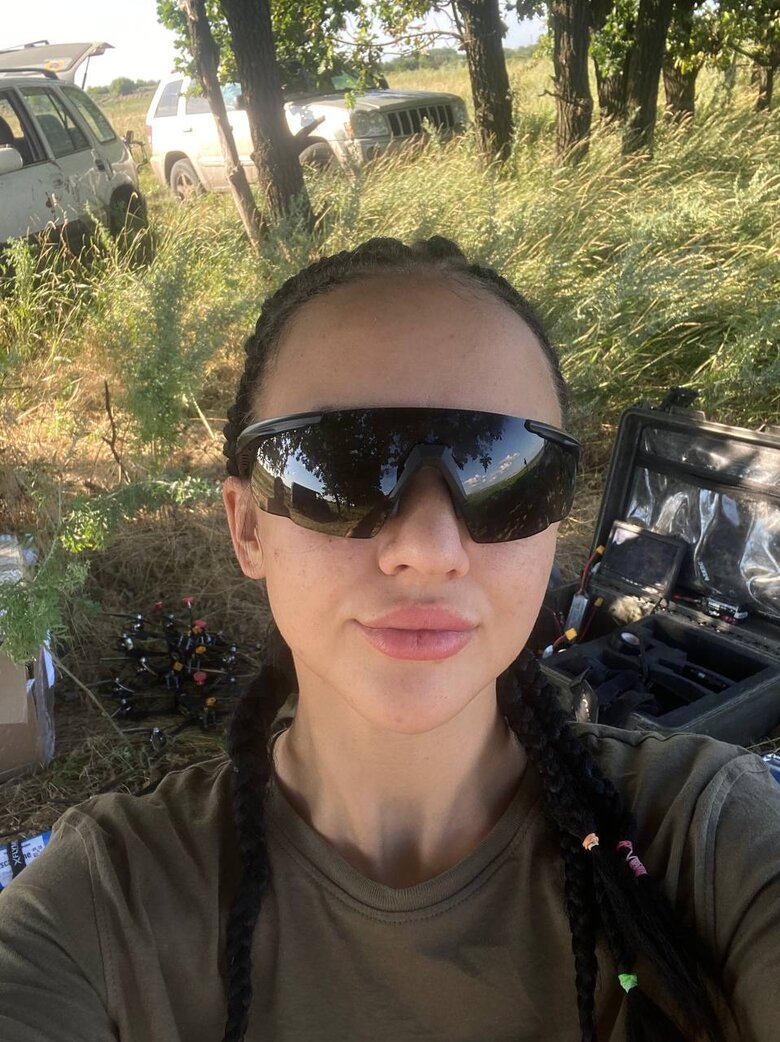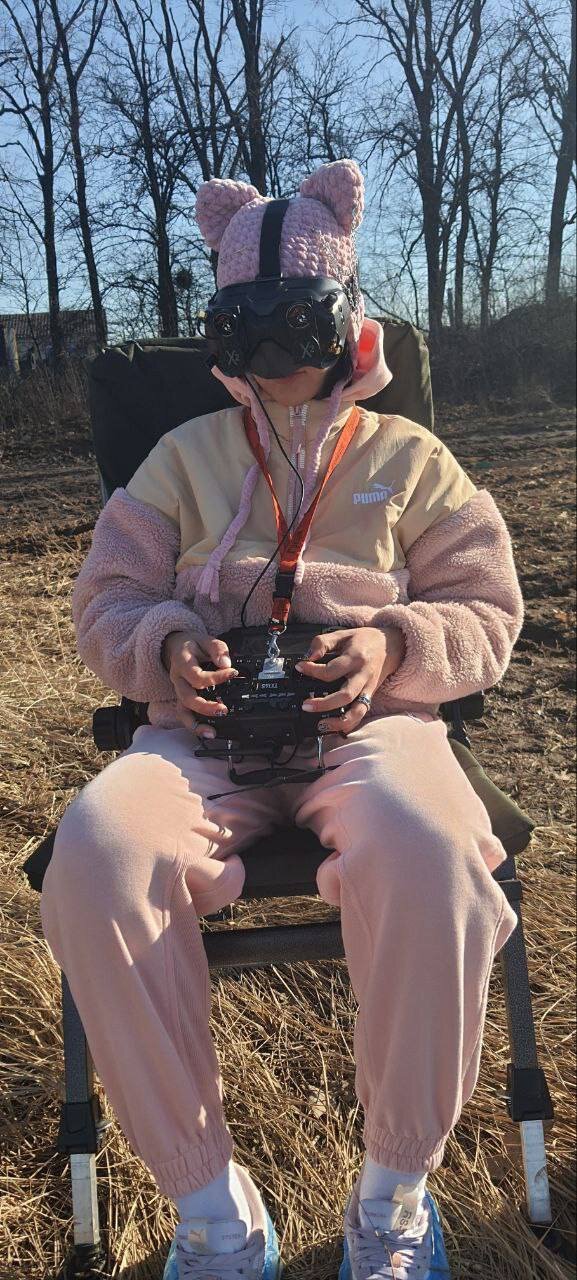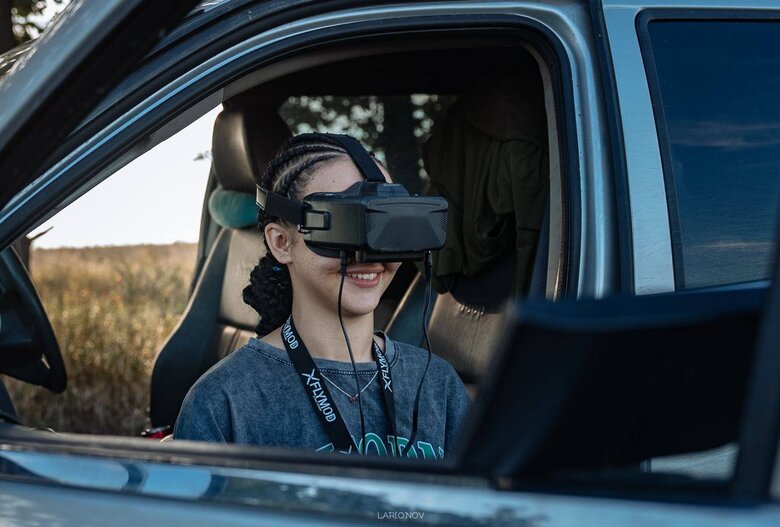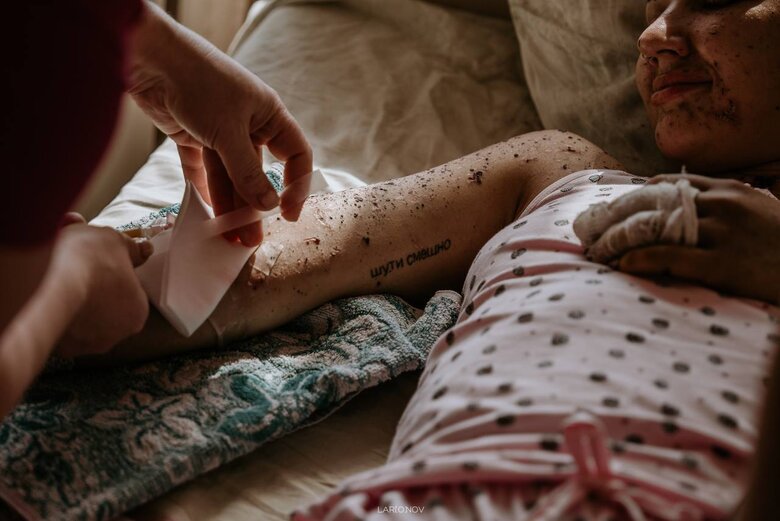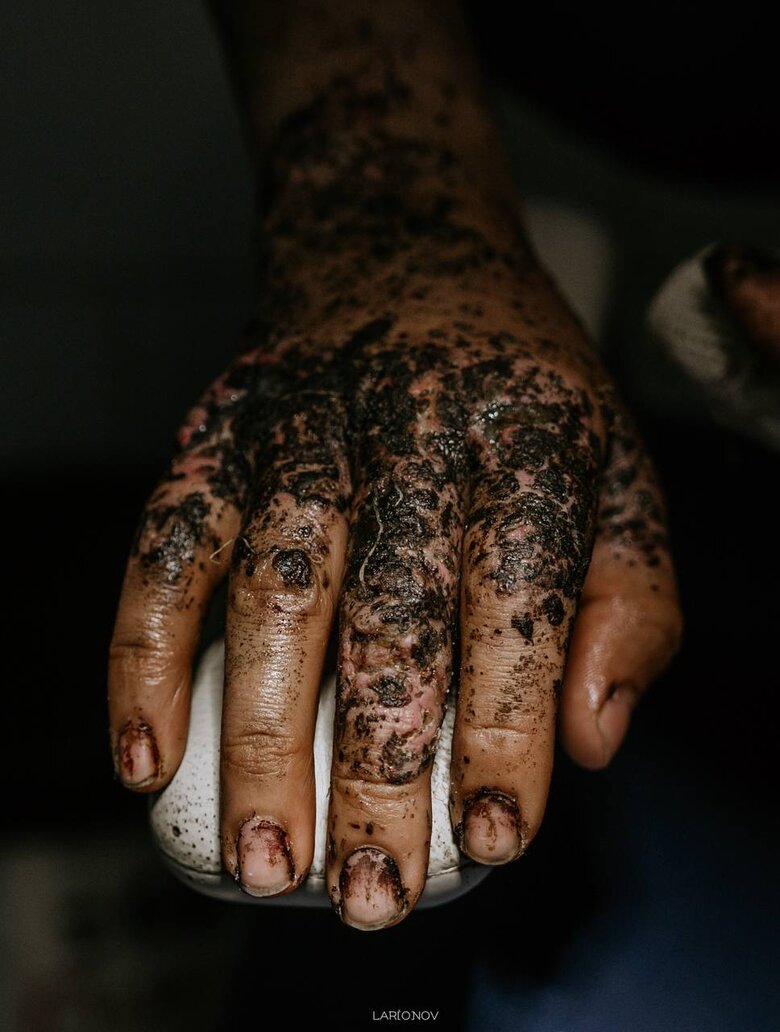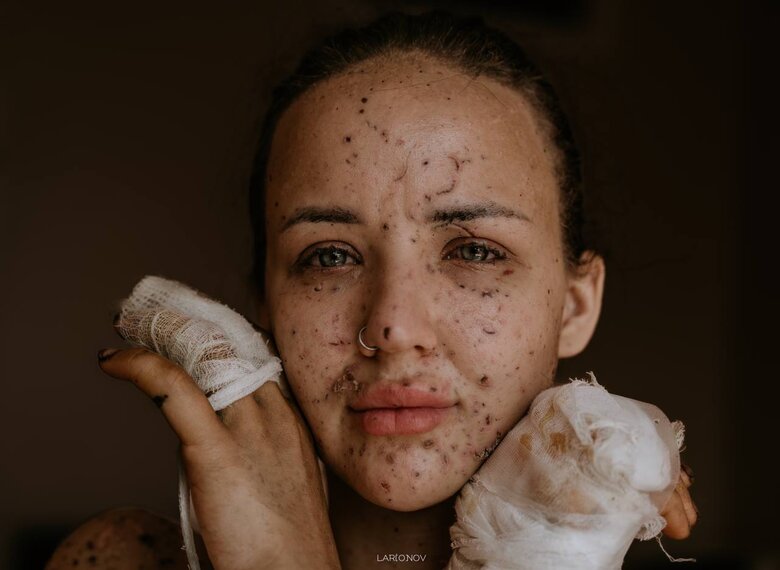FPV drone pilot Yana Zalevska: "There was flash. I fought it off with my hand. I am shouting to guys: "Arrival! I am "300"!"
Yana Zalevska, call sign Multyk, is an FPV drone pilot with the 59th Separate Infantry Brigade named after Yakiv Handziuk. She is 23 years old. Before the full-scale invasion, she was on maternity leave, studying to become a massage therapist. She planned to move to Canada to live with her husband and continue her studies and start working there. But on February 24, 2022, these prospects were destroyed.
Yana spent a month and a half under occupation in her native Kherson. After that, she decided to go to war. She was a military journalist, then a combat medic, but at some point she realised that she could no longer cope psychologically. She trained as a drone operator. She worked for a year and a half on FPV. However, on 4 August, she was wounded when an enemy drone attacked her when she was leaving a dugout. Her face and body were badly cut, and she received her fourth concussion. She is currently undergoing treatment in Lviv, but wants to return to the front. During our conversation, we recalled the entire path that my heroine has already had to go through in this war.
- Your father is a military man. Have you discussed with him the possibility of a full-scale war?
- Before the full-scale war, I was not interested in all this at all. It seemed to me that I was just a child and had nothing to do with it. The war was far away then. I only knew what it was. And on 24 February 2022, my father said: "Pack your things and go to Canada". I thought about it for about two hours and answered: "No, I'm staying in Ukraine."
- Why? You have a small child, you are in Kherson...
- I called my child's father. We decided that we had to get her out of Kherson. We agreed that he would go to the west of Ukraine, and I would join the army.
- You spent a month and a half in occupation. What was it like?
- At first, we believed Arestovych that everything would be over in two or three weeks (smiles - O.M.). They passed, and we realised that it was only getting worse. Kherson youth created a group on Telegram, where we agreed to hold peaceful rallies. We had a meeting place where a big march was already going on. Some people were wearing embroidered shirts, others were carrying flags. No one wanted Russia in Kherson. That's why people went to the tanks with their bare hands.
- Were you afraid?
- Fear sometimes does such wonders to us that we are shocked by our actions. At a rally, we met a guy who climbed onto a tank with a Ukrainian flag and the letter "Z" and drove it for a hundred metres. The fear really disappeared somewhere. We didn't have any weapons. They said that someone was given ten machine guns at the military registration and enlistment office, and that was it. We had no police. And the military was the 59th Brigade, which was on the Antonivskyi Bridge.
- I know that you have been in contact with the Russians.
- I was walking with the girls after the rally in the afternoon. There was a group of Russians standing near the TV tower. They said to us: "We have come to rescue you". I answered: "When they rescue you, they don't gassed you like they did us at the rally". They had some kind of unhealthy interest in me. Even though I was wearing no make-up and some nondescript clothes, they still had it. Well, you understand. Anyway, I told them: "I don't play such games. And you won't be able to kill me. I will kill you". They laughed and let me go.
About two weeks later, my sister found a man who was taking his family to Lviv. They took me to Mykolaiv to my dad. That's how I ended up in the military unit. My dad thought that I would hang out with him for a couple of weeks and then go to Poland to my brother and mother. I said: "No, I want to serve. I'm definitely going to the army."
- How did your dad react?
- He was shocked (smiles - O.M.), but he supported me.
- And your mum?
- She just blessed me.
- You started your career as a military journalist. Why did you eventually decide to go to war? Was it something that impressed you?
- I was lucky that I started with military journalism because I was able to see everything from the inside - how it was organised, how it went. Somehow I felt that I was not doing enough to bring the victory closer. Although for me, military journalists are also titanic people. They are in the same danger. We took them to the positions. For example, Yurii Butusov came and went out with the assault troops to conduct assaults.
But in making my decision, I stuck with combat medics. I was filming a story about them. I was both scared and wanted to help them. I told my dad that I wanted to immerse myself even more in the army. He introduced me to my next commander of the "Hamlet" reconnaissance strike group. I was sent to a medical course. I was trained in Kyiv, after which I served for eight months with an assault group as a combat medic. But I realised that I needed to change my field of activity because it was very hard. It's not just about working with the wounded - people you know personally - but also with their families. It is extremely difficult morally. And it's not even a matter of age - they say I was 21, so I reacted that way. I had already seen a lot in this war.
- The level of empathy also plays a role here. However, objectively, it is a difficult test...
- Exactly. You're with these guys 24/7. You accompany them to the assaults, wait for them to come back. And then you go to pick up their wounded. It's very hard... The commander saw this and said: "Let's get you trained as an FPV pilot".
- Could you ever imagine flying before?
- No. I will tell you more: at one time, I could not even think that I would be a combat medic or even a military journalist (smiles - O.M.). When I joined the army, I had no idea what I was going to do, who I was, what I could do. I had only a wild desire and enthusiasm to learn, to help my fellow soldiers and to do my job. That's it! Just like now.
Why piloting? Firstly, I'm sitting in a dugout. I hit the target and don't hear the Russians shouting. I don't even care! My psyche has really levelled out a bit now. Secondly, in addition to destroying targets, I also help my own men - for example, I can use a drone to bring a first aid kit to a wounded comrade who cannot be reached quickly and needs some medicine. I can also conduct reconnaissance. In general, I feel better here.
- Why FPV?
- I know how to fly Mavic. But I have chosen Kamikazes because I like them best. I don't want to be sprayed on different UAVs. It's better to be a top master in one thing.
- At the time, these drones were not as widespread as they are today.
- It's just that the FPV industry has started to develop faster. There are a lot of new technologies and frequencies. I have been working as a pilot for a year and a half. During this time, I have made mistakes and achieved good results. But, in fact, this is a great team effort. Some people develop, others fly, and others repair. There are many important nuances.
- As in communication...
- Sometimes there are troubles (smiles - O.M.). Everyone has their own character. But we find understanding.
- You mentioned Oleksii Arestovych in our conversation. About two years ago, when he was still working with the Presidential Office, he said that a woman at war is a horror. In general, there is still a stereotype in our society that war is not a woman's business. What would you say to those who still think so?
- I do not accept the attitude that this is not a woman's business. Look, I didn't go to Canada to live with my husband at the age of 21, I went to the front. It all depends on the team. We have misunderstandings because I am a woman. Someone thinks that I am given some kind of indulgence. But I go to the position for a month without leaving. I take everything I need with me, and that's it. I wake up for work like everyone else, carry heavy things, go through full training and don't miss it. I am on equal terms! But, indeed, there is sexism in the army. I have been fighting it for two and a half years.
- How?
- There was a situation when I had to kick the biggest of the group in the eye so that everyone understood: no meddling!
- What was your reaction to his action?
- He thought he was very handsome and I wanted him. You know, being a young beautiful girl in the army is a disadvantage.
I also talk to the commanders. I explain that I didn't come here for sex, sorry, that I don't need awards and medals. I am here to work! I am generally very straightforward. I can send a direct message. Yes, they do, they call me up, they call me out very insistently. I was also offered the role of a field wife. Different things happen. We talk about this with my sisters-in-arms. We try to eradicate it from within.
- There is another nuance to the gender issue. Maksym Zhorin, the deputy commander of the Third Assault Brigade, recently spoke about it : when a male commander cannot send a woman on a difficult and dangerous mission, knowing that she is likely not to return. That's why he suggests that it would be better to create separate women's brigades, so that women could command women. What do you think of this idea?
- I'll tell you more - I came to this decision myself a long time ago. I plan to return to the front. As the leader of the crew, I plan to implement this idea in my own team - to have girls subordinate to me. I am already gathering a team for myself.
- Will it simplify the workflow?
- I hope so. It's hard to say yet, we have to try. I want the girls to be like me - ideological and motivated. Even if the physical training is a little lacking, we will resolve this issue. I didn't take the young fighter's course. I went to training at my own expense and gained experience in combat. After all, it's one thing to study in a rear city, and another to apply your knowledge at the front. You know, I look at our girls and am shocked at what they are capable of. A woman can control her emotions very clearly and do her job. When I was still a combat medic, we had a protocol. You just pull yourself together - it doesn't matter if you're hurt or scared, you have to work. It's the same with FPV - there is a protocol, and everyone performs their duties. I think it will be easy for me with women. It will not be, to whom and how I smiled - already minus a quarrel (smiles - O.M.).
- Tell us, what was your first flight like?
- There was a tank in the field. It had already been hit, but the Russians could still repair it - they were doing something under it. The commander said to me: "You have to hit a stationary target". But before that, you have to fly over your own positions, then the Russians. I was worried about get it across so that the EW wouldn't hit it, but I hit it. The tank burned to the ground.
- And the Russians?
- They got out. I don't know if they survived. But at least they were left with contusions and hit by the debris.
- Where did you fight?
- We spent eight months in the Kherson sector and the rest of the time in Donbas. We arrived there at the end of 2022.
- It was a difficult situation in Bakhmut...
- I did not go to Bakhmut itself. Some of our guys were there. I have a direction, let's say, Donetsk. I can't be specific.
- What do you think of the Russian military?
- There are a lot of them. For them, putting down a hundred of their own soldiers in a day is a piece of cake. It's an expendable item. We just don't have that many, you know? We have real people, not consumables. Those who did not study military specialities, who left their normal lives and came here. Some of them were builders, businessmen, others were shawarma makers. At the front, they simply learn everything from scratch and become professionals in their field. And the number of Russians on the battlefield is growing. You destroy them, destroy them, and they keep coming, crawling and crawling. I understand that our enemy is not a fool, as they try to tell us in Telethon. These are smart people who have been preparing for many years to come and destroy us. They are trained for this. They are much better at it. I read their methodology. They even present information much better, "chewing it up" in more detail. Unfortunately, our enemy is still stronger than us.
- Unfortunately...
- But the fact that most of our people are titans who fight bravely is obvious.
- How were you injured?
- On the fourth of August, I was in position. We were flying. There were neighbouring units nearby. I had to get out of the dugout. I heard a drone. And here my self-confidence played a cruel joke on me - you have learned to hear a drone flying away in a year and a half. And it wasn't even flying at us. But their pilot saw me coming out and sent anti-tank guided missile at me. There was a flash. I fought it off with my hand. I shouted to the guys: "Arrival! I am "300"!". They came out and took me by the shoulders. They started calling: "We have a pilot wounded!". I was immediately evacuated. In the evening, I was in Dnipro at Mechnikov Hospital. They stabilised me there. From there I was sent to Lviv.
- What are your injuries? I see that your body and face are badly cut. Your eyes are damaged.
- There were fragments in my eyes. In my hands, too - now they are cleaning them, and then they will remove the scars. The burns have already healed. You can see the cuts.
- You also have four contusions.
- But we didn't record everything. The first two I thought I was so smart and young, and they were easy. However, they all make themselves felt together. I have lapses in my memory. I also don't have two eardrums.
- After Dnipro, you were transferred to Lviv. Tell us about your treatment.
- Yeah. I was found by the "Unburnable". Oleksandr Turkevych is working on my face. I am very grateful to them.
Although, you know, even in Lviv it was not possible to stay away from the war. My mother rents an apartment here. Recently (on 4 September - O.M.) there was an air raid nearby, when almost the whole family died. One of the girls was a volunteer with the "Unburnable"...
- I am sorry to ask this question, but it may help those who have similar injuries. Your face was badly injured. You can't hide it under your clothes. How have you accepted what is happening to it psychologically?
- In fact, my injury has changed my perception of myself and the world around me. Before the full-scale war, I wanted to correct my nose (smiles. - O.M.), but today I don't - I'm happy with everything now. When I went to war, I knew that anything could happen, including amputation of a limb. So I was mentally prepared. Now I can accept myself. Nothing can spoil our Ukrainian female beauty.
- Because a Ukrainian woman glows from within.
- That's right! You know, when Russian publics started posting about me with the caption that I was injured in the Kursk region, I realised that I was doing everything right in this life if they were afraid of a 23-year-old girl. They write to me on social media, threaten me. I periodically delete them.
- By the way, I see on social media that you are extending the fees to drones. In one of your posts, you wrote the following phrase: "I don't count on the state". Why is that?
- I am fighting for the money I have earned, the money that the Ukrainian people give me, and thanks to volunteer help. My first station was bought with money raised by people. I needed 54,000 hryvnias, and people helped me. It still works and performs its functions. Honestly, I was ashamed to ask. So then I started spending all the money I earned on my work. I helped my family a little, but left myself in the red. Isn't that normal?
- Absolutely! And the president promised a million drones for this year, which is already ending...
- If this were the case, I wouldn't have asked people for help or opened a fundraising. Especially one so big. How did it work out with this one? I have just put it up with my photo and the signature "Faces of a non-women's war", and it promoted. Everything is official with me - through documents, cheques, reports.
- Finally, I would like to recall another quote from you: "My goal is to see Ukraine's victory with my own eyes." When do you think this might happen? I don't think it's in the foreseeable future. But maybe you are already dreaming about something?
- I dream that my daughter would not go to war. I came here for her sake. But I see what is happening. So I think, unfortunately, she will be at war too...
There is an important point here: unless people want to change something in the country, we will not be able to achieve this victory. Until they stop waiting for the military to come back from the front and set things right, nothing will happen. Changes are needed now. Yes, it is scary, sometimes radical. But if we do not stop turning a blind eye to corruption and injustice today, we will not succeed. If people continue to steal and the army does not receive everything they need, then people should not ask when will the victory come?
Olha Moskaliuk, "Censor.NET"
Photos and video were provided by Yana Zalevska

